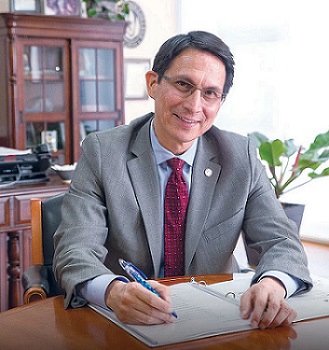Frank D. Sánchez is the president of Rhode Island College. The state-run school in Providence announced Jan. 6 that Sánchez will not seek a new three-year term as its president and will leave on June 30 when his contract expires. Sánchez spoke with Providence Business News about his time at RIC and what his plans are moving forward.
PBN: What led you to decide not to seek a new term as RIC president?
SÁNCHEZ: A lot of good things have happened at the college over the last six years, and it is in a much stronger place than when I started in 2016. There are some personal reasons. My youngest is finishing high school, so there are some family reasons [as to why I’m leaving]. I think it’s a good time to look at some other options.
We’ve moved the dial on so many fronts. We’ve moved up in national rankings for the first time. The college broke the top 100 of Masters [programs] and universities, according to the Washington Monthly. We’ve increased fundraising by nearly 200% over the last six years. You also tack on the work we’ve done on the facilities side and the physical, we’ve either secured or completed about $115 million in modernizing many of our academic buildings on campus. When you look at all that combined, the timing for a transition, and potentially doing a national search for a new leader, is really good because there’s a lot of momentum and a lot of progression at the institution right now.
PBN: How big were the renovation projects to help the college stand out among other local institutions to update the campus and attract new students?
SÁNCHEZ: When I arrived here, they were just breaking ground on a $55 million bond and we completed that by updating Gaige Hall, Craig-Lee Hall – which is our largest academic building – and built an entire wing on Fogarty [Hall] for our school of nursing. In 2018, voters in Rhode Island supported a $25 million bond to modernize our teacher education building Horace Mann [Center]. That is going to be opening up this fall. In 2021, voters in Rhode Island approved a $38 million bond to modernize our Clarke Science Building. All of those combined really elevated and modernized so many of our academic buildings on campus.
PBN: RIC was hit hard by COVID-19 for various reasons and forced the college to make tough decisions as a result. Is that a regret of yours because those tough decisions had to be made?
SÁNCHEZ: Not at all. Colleges across the country had to deal with and manage COVID, whether it was enrollments or economics. They all had to respond. There are always tough decisions that have to be made. I think we did very well to support Rhode Islanders the best we can to keep a healthy and safe community.
When you have 70% of your graduates staying in Rhode Island, it really speaks to the importance of this institution and our mission to serve Rhode Islanders. The nature of these jobs are always tough decisions that have to be made, but I think we’ve done very, very well over the last several years during my tenure.
PBN: What would you say is the initiative that you are most proud of during your time at RIC?
SÁNCHEZ: We have been very effective in reducing the out-of-pocket expense for Rhode Islanders. We’ve done a number of things to get that done. We partnered with the R.I. Public Transit Authority to dramatically reduce public transportation expenses for our students. Ninety percent of our students are commuter, so many more of our students have affordable transportation.
We are leading the state in promoting open educational resources, essentially textbooks online. This year, we have saved our students almost $1 million in textbook expenses because of that initiative. Through philanthropy and fundraising, we’re creating more scholarships to support students financially. I’m proud of that collective work to provide greater access and opportunity for Rhode Islanders to get a high-quality, high-value college degree.
PBN: What does the future hold for you after RIC?
SÁNCHEZ: I’ll be sharing soon with the campus community what my plans are in the not-too-distant future. There are opportunities both regionally and nationally. I want to continue to be a service to higher education. There’s still a lot of need, certainly for communities to get a higher education degree. I’m anticipating staying in the field.
James Bessette is the PBN special projects editor, and also covers the nonprofit and education sectors. You may reach him at Bessette@PBN.com. You may also follow him on Twitter at @James_Bessette.













